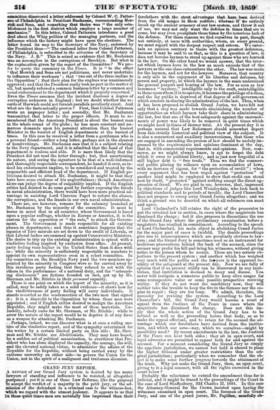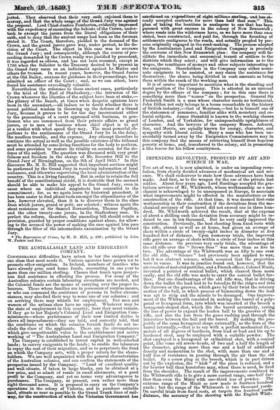GRAND JURY REFORM.
A REFORM of our Grand Jury system is desired by too many lawyers of standing and influence to be resisted, or altogether postponed ; yet it is one of those Law Reforms, like the proposal to accept the verdict of a majority in the petit jury, or the ad- mission of the defendant in a criminal case to the witness-box, which we regard with the utmost jealousy. It appears to us that in these quiet times men are naturally less impressed than their forefathers with the stout advantages that have been derived from the old usages in these matters ; whereas if we entirely . break up the ancient armoury of our law system, and throw it out of use, we may not only want the defence in times that are to come, but may even precipitate those times by the notorious lack of the defence. For these reasons we find. ourselves in part, though not entirely, at issue with authorities, whom, on every ground, we must regard with the deepest respect and esteem. We enter- tain an opinion contrary to theirs with the greatest deference, because it may be said to us that, as this is a question of law, it does not become laymen to stand up against those who are learned in the law. On the other hand we would. answer, that the inter- est which laymen have in the law as much exceeds that of the lawyers as the one class outnumbers the other. The law was made for the laymen, and not for the lawyers. Moreover, that country is only safe in the enjoyment of its liberties and defences, for, person and property, in which the laymen in the main understand the general purport and bearing of the law. For as soon as law becomes a " mystery," intelligible only to the craft, unintelligible to those upon whom it is to operate, it becomes the privilege of a class, and the lay public is deprived of that degree of self-government which consists in sharing the adminstration of the law. Thus, when it has been proposed to abolish Grand Juries, we have felt not only that a step was made towards diminishing the number of opportunities on which laymen take their share in administering the law, but that one of the best safeguards against the encroach- ments of power was likely to be removed. in quiet times which we might need in times of sterner trial. At the present day it is perhaps natural that Law Reformers should somewhat depart from this strictly historical and political view of the subject. It is also a concurrent and auxiliary inconvenience, that those who are engaged in amending the process of law should. be unduly im- pressed by the requirements and opinions dominant at the day, that is, with commercial requirements and opinions. Now, com- merce, as we might always know, is apt to forget the debt which it owes to political liberty, and is just now forgetful of :a still higher debt to " free trade." Thus we find the commer- cial public placing its reliance upon an accumulation of laws, with an increase of rigour, for " the protection of credit" ; when every argument that has been urged against "protection" of another kind might be employed to show that credit can stand best by itself, " protected " against nothing except the direct ag- gression of fraud. We are glad to see, however, that, impressed by objections of, judges like Lord Wensleydale, who look back to political standards and to periods of trouble, the Lord Chancellor does not propose to sweep away Grand Juries altogether; and wen think a ground can be descried on which all reformers can meet and agree.
Lord Chelmsford's bill retains the right of the prosecutor to put the criminal law in motion, in cases where the magistrate has dismissed the charge ; but it also proposes to discontinue the use of the Grand Jury where the preliminary examination before a. magistrate has resulted in commitment. According to the speech of Lord Chelmsford, his main object in abolishing Grand Juries for the major part of cases is twofold. The double proceedings give rise to inconveniences which are peculiarly obvious to law- yers ; and the Grand Jury is sometimes used as an instrument for malicious prosecutions behind the back of the accused, since the accuser may prefer his bill and bring his witnesses, without giving notice to the person whom he assails. These are two serious ob- jections to the present system; and another which has weighed very much with the public and the lawyers is the apparent in- utility of the safeguard at the present day. Now we are fully of opinion that if no present utility can be discovered in any insti- tution, that institution is doomed to decay and disuse. You never will instigate a numerous public to keep alive usages for some retrospective value or some possible prospective reviving utility. If they do not want the machinery now, they will neither take the trouble to keep the fire in the furnace nor the en- gine in repair ; they are too busy. We admit, therefore, the necessity for revising the system. According to the Lord Chancellor's bill, the Grand. Jury would become a court of appeal from the Justices of the Peace in cases where the magistrate has dismissed the charge. Does not this im- ply that the whole action of the Grand Jury has to be revised as well as the proceeding before that body, so as to make the appeal effectual, and to retain for the accused the ad- vantage which our forefathers have derived from the institu- tion, and which our sons—nay, which we ourselves—might by possibility need ? By recent amendments in the law, the Justices of the Peace can hear both sides ; they sit in open court, and legal advocates are permitted to appear both for and against the accused. For a moment considering the Grand Jury as simply the appellate jurisdiction, we cannot but hold it absurd to place the higher tribunal under greater restrictions than the ori- ginal jurisdiction ; particularly when we remember that the ob- ject is to make some further progress towards the attainment of the truth. Why not make the Grand Jury, then, an open court, giving to it a legal assessor, with all the rights exercised in the court below ?
Probably the reluctance to extend the amendment thus far is judicial, and it might be traced to the proceedings of the Court in the case of Lord Shaftesbury, 33d. Charles II. 1681. In this case the Attorney-General for the Crown insisted upon having the witnesses examined in open court. The foreman of the Grand Jury, and one of the grand jurors, Mr. Papillon, manfully oh- jetted. They observed that their very oath enjoined them to secresy, and that the whole usage of the Grand Jury was against the proposal. Lord Chief-Justice Pemberton, evidently impressed with the expediency of executing the behests of the Crown, under- took to exempt the jurors from the literal obligations of their oath, and to deny that the ancient usage had been as the foreman stated it. The Conn, therefore, yielded to the demand of the Crown, and the grand jurors gave way, under protest, to the de- cision of the Court. The object in this case was to overawe the Grand Jury • and consequently, although the course of pro- ceeding demanded by the Crown really was justified by precedent, it was regarded as odious, and has not been resumed, except in 1796 when the Solicitor to the Treasury desired to be present in the Grand Jury room on an indictment against Le Maitre and others for treason. In recent years, however, the Grand Juries at the Old Bailey, anxious for guidance in their proceedings, have admitted an officer of the Court ; and, as we can attest, have found his assistance exceedingly valuable.
Nevertheless the reference to those ancient cases, particularly to the trial of the Earl of Shaftesbury,—the intrusion of the Crown whenever the liberties of the subject have been at stake,— the pliancy of the Bench, at times when despotic opinions have been in the ascendant, —all induce us to doubt whether there is sound political wisdom in throwing up the defence of a Grand Jury, because it proves to be for the day inconvenient either to the proceedings of a court oppressed with business, to gen- tlemen who are summoned from their private affairs as grand jurors, or to men of business whose chief object is to get at a verdict with what speed they may. The most powerful ob- jections to the continuance of the Grand Jury lie in the delay, the needless trouble, and the expense. Any attempt therefore to continue the actual as well as the possible existence of the tribunal must be attended by some living functions for the body to perform, and some provision to restore its vitality on occasion for the de- fence of the subject The question was discussed with very great fulness and freedom in the charge of Mr. Recorder Hill to the Grand Jury of Birmingham, on the 9th of April 1855.* In this discourse Mr. M. D. Hill suggested that important services might be .performed by the Grand Jury in receiving information of local nuisances, and otherwise supervising the local administration of the country. This is a living function. But in order to retain the full benefit of the constitutional shield, it is desirable that the accused should be able to make his appeal to the Grand Jury, even in cases where an individual magistrate has consented to the commitment ; for, as we again learn by historical precedent, it has been easier to find pliant tools amongst the stipendiaries of the law, however elevated, than it is to discover them in the class from which jurors, grand or petit, are selected; witness again the stout resistance of Sir Samuel Barnardiston, Thomas Papillon, and the other twenty-one jurors, in the Shaftesbury case. To perfect the reform, therefore, the amending bill should retain a provision, guarded by proper conditions against abuse, for allow- ing to the accused the power of making the case against him pass through the filter of the intermediate examination by the Grand Jury.
* The Repression of Crime, by M. D. Hill, p. 439; published by John W. Parker and Bon.



































 Previous page
Previous page